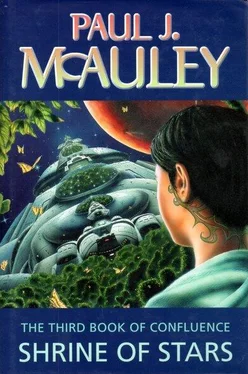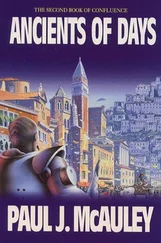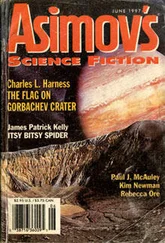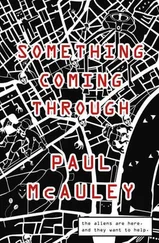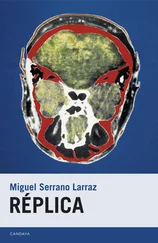Pandaras stood, his hands spread in front of him. He was covered in cold sweat. Ayulf grinned and raised the pistol—and then his arm slammed backward into one of the posts which held up the roof. The pistol clattered on the floor.
Tibor lowered the arbalest. “We go,” he told Pandaras. Ayulf pawed at the bolt which pinned his forearm to the post and screamed at the women, “Get me free! Kill them and get me free!”
The old woman rose from her stool. The floor of the shanty creaked under her weight. “Go,” she told Pandaras. “I will tend to him.”
Pandaras jerked the poniard from the planking, scooped up the pack and stuffed two bottles of arak in it, and ran after Tibor. He more or less fell through the branches of the banyan and landed on his back in the stinking water which half-filled the pirogue.
As Tibor pushed off from the banyan, Pandaras fixed the reaction motor to its post and asked Tibor if he had mended the fuel tank.
“With a plug of resin,” Tibor said.
Pandaras’s hands were shaking badly. He got half the arak over himself when he tried to fill the tank. The motor started on the third attempt and spat a mass of bubbles with a coughing roar. Pandaras shoved the tiller up. The motor’s inlet flooded with a solid thump and its outlet spewed a creamy wake that glimmered in the darkness and the pirogue shot forward. With Tibor using his paddle to steer, they made a wide arc toward the open river, the constellations of lights strung through the banyan dwindling into the darkness of the shore.
Looking back, Pandaras saw Ayulf stagger to the veranda. Something was on his shoulder: the culverin. A tongue of flame burst from its throat. Ayulf fell backward and the roof of the shanty caught fire.
The reaction motor ran out of fuel just as the sun began to free itself from the band of blue haze that marked where the Rim Mountains stood, far beyond the nearside shore of the Great River. When the motor sputtered to a stop, Pandaras tipped it up on its frame. Tibor, kneeling in the bow of the pirogue, set to with the paddle.
Behind them, across several leagues of water, the mangroves of the far-side shore made a ragged black line against the brightening sky. There was no sign that Ayulf had tried to follow them; no doubt he was too busy trying to save his shanty from the blaze caused by the misfire of the culverin.
“The women told me that they put something in his arak to make him sleep,” Tibor told Pandaras, “but they knew that he would try to kill you when he woke and found you still alive, even though he was very afraid.”
Pandaras showed his teeth. His head and stomach still hurt, but he was no longer drunk. He said, “Of course he was afraid. That’s why he drank so much—because he was afraid, and because he was ashamed of his fear. I would have killed him if he tried anything, and he knew it. I’ve killed bigger men than him, and they wore armor and carried energy pistols.”
It had only been one man, the guard at the gate of the house of the rogue star-sailor. Pandaras had killed him by a trick and had been captured by the other guards almost immediately afterward, but he was certain that he could kill again if he had to.
“Ayulf was afraid of me, not you, little master,” Tibor said placidly. “He knew that I am yours to command, and that I would have intervened if he had tried to shoot or stab or strangle you. But he also knew that once you were dead, I would have served him. He smeared poison in the bottom of your glass, the poison fisherfolk use to stun fish, but you poured away most of the arak he gave you, and that saved you.”
“Hah. You suggest that you are more valuable than me. But who is the master here, and who the slave?”
“I know my price, little master, because I was sold on the open market and Captain Lorquital paid well for me. But do you know your worth?”
“It isn’t measured in coin,” Pandaras said. “And I think that you overestimate your value. What’s the use of someone who can fix a reaction motor but forgets that it needs fuel?”
“I thought that we should leave quietly and quickly.”
“And forgot my master’s book and the money, too.”
“You were nearly killed when you went back, little master. Life is more important than things.”
“Easy to say if you’ve never owned anything. The book is important. Don’t you remember how much time my master spent studying it? And we’ll need money, soon enough.”
Tibor paddled silently for a while.
“Well,” Pandaras said at last. “Ayulf got what he deserved. Why do those women stay with him, do you think?”
“I understand that it is the custom of the fisherfolk to offer up hostages to secure bargains between different families. And so they secured bargains with Ayulf, although I do not believe that he understood what obligations he owed them. The eldest of the women told me that she knew a great chief called Oncus. She recognized his fetish, and that is why she decided to save you.”
Pandaras touched the coypu-hair fetish, which he wore on his upper arm, over his shirt. It was loose there, although it had fitted snugly on his master’s wrist. He said, “I had forgotten the name of the old croaker who helped us when Prefect Corin tried to flush us out of the floating forest. What luck, eh?”
“Who can say what is luck, and what is the will of the Preservers?”
“That’s easy. A man makes his own luck. Anything else is a gift, but no one should hope to build their lives on the gifts of others. My master was clever enough to leave the fetish behind so that I would know he had been taken alive, and I was clever enough to find it and to wear it. So it was by the luck I made from my master’s forethought that we were saved.”
“Yet our lives are the gifts of the Preservers,” Tibor said solemnly. “You are engaged on a holy task, little master, and you should behave accordingly.”
“A holy task?”
“Why, you seek your master, of course. Did you not tell me that he will raise up all the indigenous peoples? If that is true, may he not also redeem the sins of my own people, and of all the races of hierodules?”
“We have to find him first,” Pandaras said, and touched the ceramic coin which, hung from his neck on its leather thong, dangled inside his shirt. “I fear for him.”
Pandaras had been badly weakened by the dose of poison, and was suffering from stomach cramps. While Tibor drove the pirogue steadily toward the nearside shore, he sat in the stern and leafed through the book he had risked his life to save.
He knew that this was an old and valuable copy of the Puranas, and that some of its pictures had been changed when his master had visited a shrine. They were quite unlike any Pandaras had ever seen before, but because, like many of his people, he was a gifted storyteller, he was able to guess something of their narrative. One of the Ancients of Days had escaped from the others and had become mixed up in a Change War. Then her ship had found her, and she had been executed by the rest of its crew. Pandaras knew that there must be more to the story than that, for his master had studied long and hard in the book while the Weazel had sailed downriver, but he could not riddle it and at last put it away.
It took a day and a night to paddle the rest of the way to the nearside shore, a patchwork of marshy fields, dense green woods and little villages. Many of the villages stood a league or more from the shore, stranded there by the river’s slow retreat. Pandaras carved a flute from a joint of bamboo and usually managed to win his supper each night by playing a medley of tunes. He quickly discovered that those he had learned as a child and put away when he had grown older were most appreciated by the indigens. In that sense at least they were as children, but Pandaras thought that the children of men would be less trusting and less innocent than these simple folk.
Читать дальше
